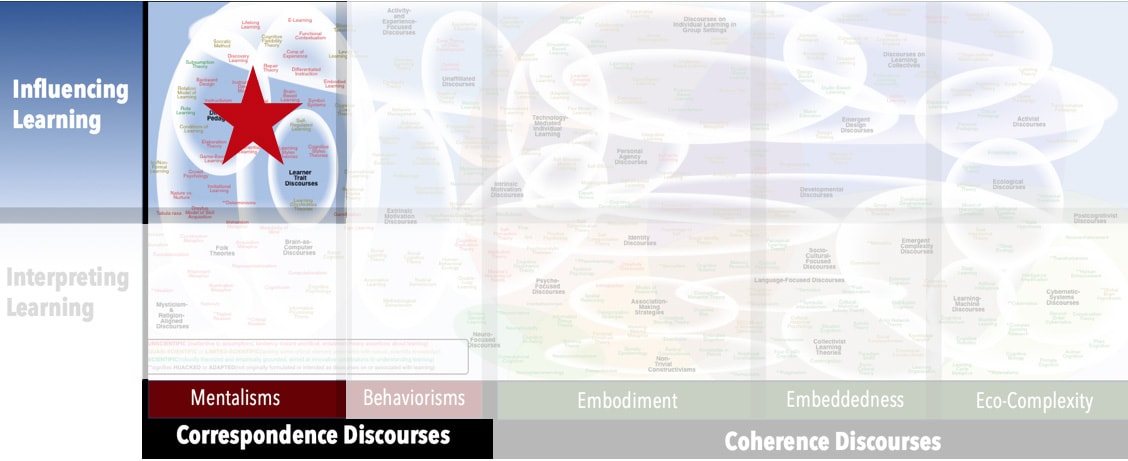Focus
Formats to support individual inquisitivenessPrincipal Metaphors
The phrase “discovery learning” might be encountered anywhere on the map of learning theories, as it is embraced and rejected by theorists of all stripes. It is thus impossible to offer a concise representation of the metaphoric flock surrounding Discovery Learning, and so the focus here is on its metaphorical grounding and the affordances and distortions that appear to arise from that grounding. To that end:- Knowledge is … hidden object
- Knowing is … having discovered
- Learner is … a seeker (individual)
- Learning is … discovering/uncovering and acquiring
- Teaching is … facilitating, guiding
Originated
Ancient (entrenched in the language)Synopsis
Interpreted directly, Discovery Learning is rooted in the assumption that knowledge is out there, and learning is about finding it:- Discovery Metaphor (ancient) – originally meaning “unconcealing,” from the Latin dis- + cooperire “opposite of cover up,” a notion associated with assumptions that knowledge has a pre-existent, object-like form and that it has been hidden from immediate perception
- Profoundness Metaphor – from Latin profundus “deep, obscure, extensive,” a metaphor linking complexity of a learning to the physical quality of vertical depth, and so a notion tethered to a Discovery Metaphor (i.e., the “deeper” one goes, the more one discovers). In popular usage, “profundity” are “depth roughly synonymous “sophistication” when used in reference to ideas or understandings.
- Unassisted Discovery Learning – a phrase that is usually used as a criticism, to describe modes of Discovery Learning in which learners are afforded little or no assistance from the teacher
- Enhanced Discovery Learning (L. Alfieri, 2010s) – a mode of Discovery Learning in which the teacher provides assistance, in the forms of ensuring necessary preparation to engage with the nuances of the content, inserting timely prompts and challenges as students proceed, and helping learners to parse more complex undertakings
- Thinking Classrooms (Peter Liljedahl, 2010s) – a type of Discovery Learning in school mathematics that revolves around the insistence that students engage in non-routine questions that compel them to “think” (which, in this instance, is used as an antonym to “mimic” another’s strategy). Associated constructs include
- Vertical Non-Permanent Learning Surfaces (Peter Liljedahl, 2010s) – whiteboard (or other erasable surfaces) mounted vertically, ostensibly facilitating classroom management while affording the teacher a direct vantage onto student learning
Commentary
Discovery Learning means vastly different things to different people – and thus has frequently served as a lightning rod for groundless arguments, but rarely the focus of intelligent debate. Mere usage of the phrase, whether by opponents or advocates, might be taken as an indicator that the speaker has limited knowledge of the theories of learning and/or teaching being criticized or supported. The underlying issues are multifaceted, but they can usually be traced to people using the same words to mean very different things. Heard by someone who inhabits a mindset consistent with Correspondence Discourses, “discovery” is readily aligned with the Acquisition Metaphor’s versions of knowledge and learning, and so its advice that teachers should avoid telling, spoon-feeding, or engaging in other delivery modes will come across as inefficient and frustrating. However, when invoked by someone who inhabits a mindset that is consistent with Coherence Discourses, it is likely that the intention is to interrupt notions of “knowledge as object” and “learner as receptacle.” Phrased more concisely, whenever “discovery learning” is placed at the center of an argument about teaching, there’s a really good chance that the arguers aren’t listening to one another at all, but rather digging their heels deeper into their respective, uncritical biases.Authors and/or Prominent Influences
As with the Acquisition Metaphor, the underlying assumptions of Discovery Learning run deep in western worldviews. It is thus impossible to identify seminal thinkers. Notably, however, Discovery Learning rose to considerable prominence in the 20th century, prompted in large part by thinkers associated with Radical Constructivism and its associated theories of teaching such as Inquiry-Based Learning. Trivialized versions of those theories (see Construction Metaphor) were interpreted to be condemnations of direct instruction and calls for discovery-based teaching.Status as a Theory of Learning
Discovery Learning is not a theory of learning, because it does not interrogate what learning is or how learning happens. Rather, it builds on the commonsense realizations that personally meaningful topics and flexible, explorative settings can support more engaged learning.Status as a Theory of Teaching
Most often, Discovery Learning is presented and discussed as a theory of teaching – but is subject to a troubling diversity of interpretation, and it is perhaps most often taken as advice not to tell.Status as a Scientific Theory
Discovery Learning is a descriptive notion. It does not have an empirical base.Subdiscourses:
- Discovery Metaphor
- Enhanced Discovery Learning
- Profoundness Metaphor
- Thinking Classrooms
- Unassisted Discovery Learning
- Vertical Non-Permanent Learning Surface
Map Location

Please cite this article as:
Davis, B., & Francis, K. (2023). “Discovery Learning” in Discourses on Learning in Education. https://learningdiscourses.com.
⇦ Back to Map
⇦ Back to List
